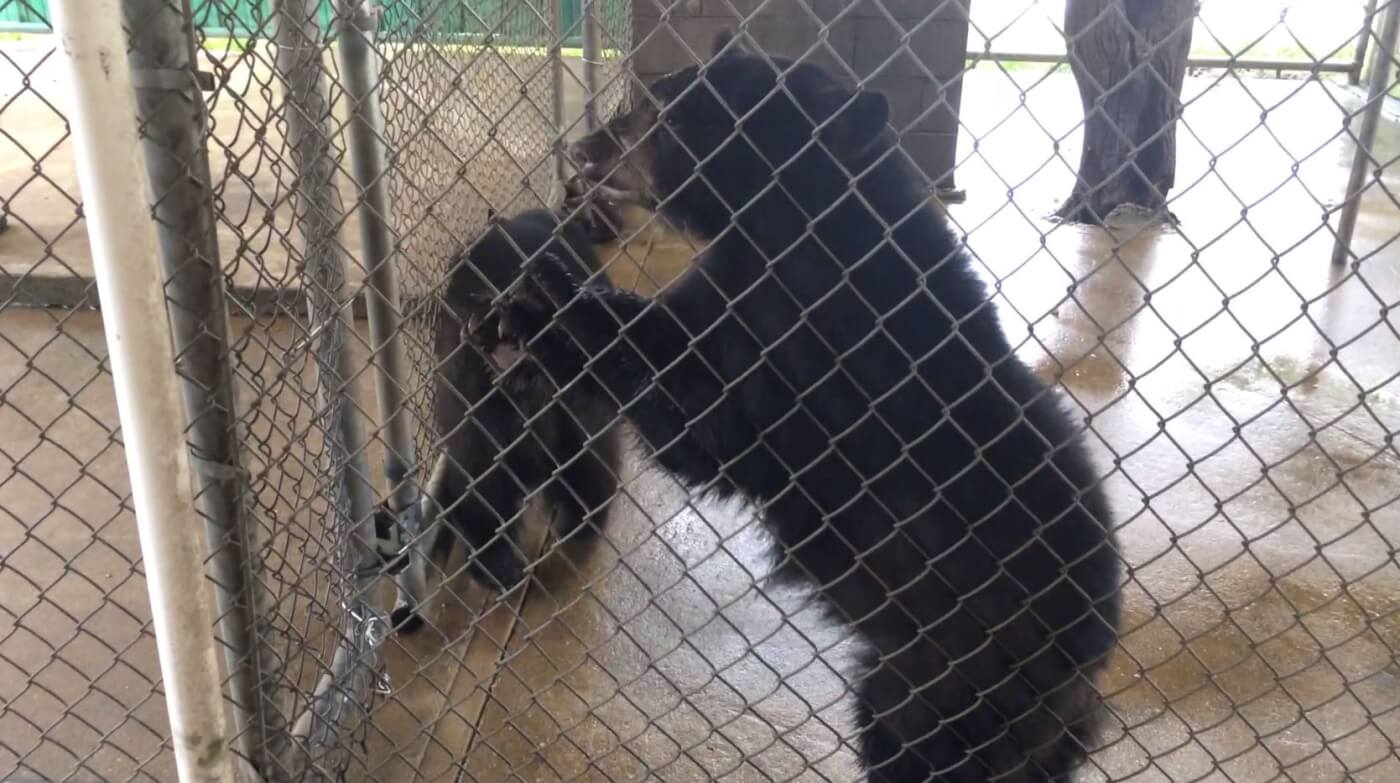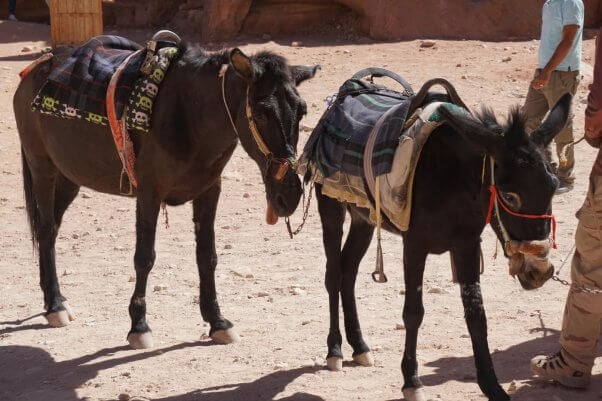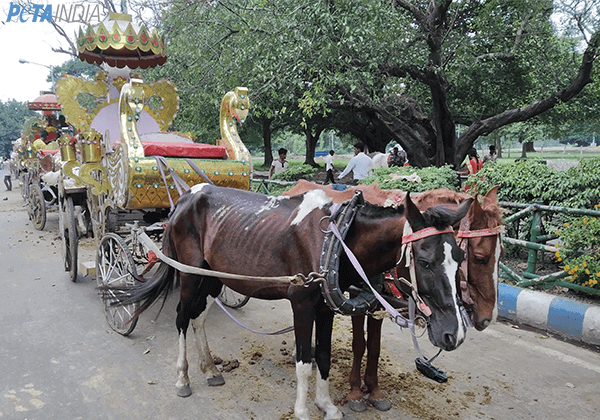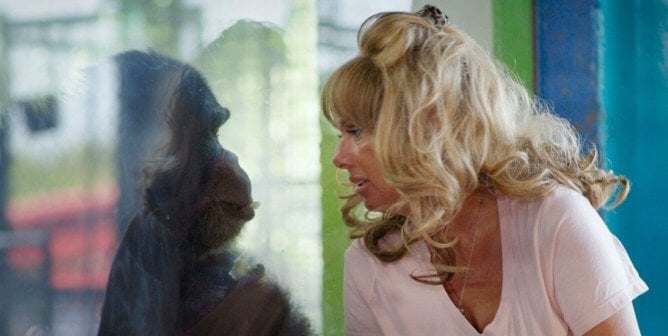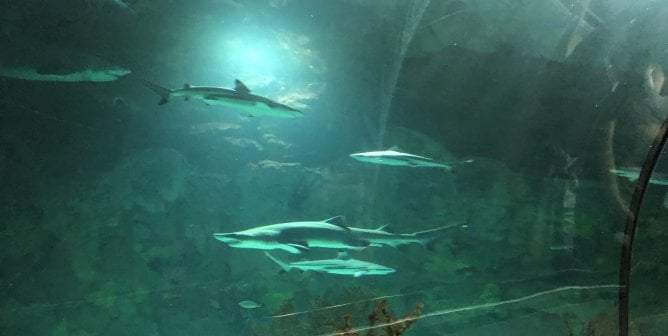How to Be a Compassionate Traveler
When making travel plans, please be sure that cruelty isn’t on the itinerary. An explosive report revealed that the tourism industry exploits more than half a million animals worldwide. Avoid animal attractions—from selfies with bears to elephant rides and everything in between—and be sure you travel vegan.
When planning your next getaway, be kind to other animals by avoiding these activities:
Elephant Rides
Elephants are intelligent, self-aware individuals who enjoy traveling in tight-knit herds. They don’t want to give rides to tourists.
At one “elephant park” in Thailand, an elephant who was being forced to carry a man and his daughter rebelled, trampling and goring the man to death. Many other elephants have also reached a similar breaking point, injuring or killing humans. Witnesses reported that shortly before the attack, the mahout (handler) had hit the elephant several times with a bullhook, a weapon resembling a fireplace poker with a sharp hook at one end. Just a week earlier, a mahout at the same facility was caught on tape hitting and taunting an elephant.
Selfies With Baby Bears or Other Animals
For tourists, taking a photo with an animal is over in an instant, but for baby bears, primates, and others, that moment is part of a lifetime of misery at a roadside zoo or other attraction. Baby bears used as photo props are typically torn away from their distraught mothers when they’re just weeks old and then subjected to extreme stress and even physical abuse. Once they’ve grown and become too dangerous to handle, they’re typically relegated to barren enclosures. Taking selfies with bears has nothing to do with education, despite the claims that tourist-trap operators may make. Animals exploited for interactions with humans are bred for only one reason: to line the pockets of their abusers. In 2022, President Joe Biden signed a law banning interactions with big-cat cubs, which was a good start to ending this problem, but selfies with tigers are still prevalent in other parts of the world, and it’s wrong to inflict this torment on any animal.
Remember, bear and tiger cubs aren’t the only ones who suffer for photo ops. Avoid any place that allows people to interact with bears, sloths, tigers, reptiles, monkeys, alligators, otters, lions, or any other animals.
Bullfighting
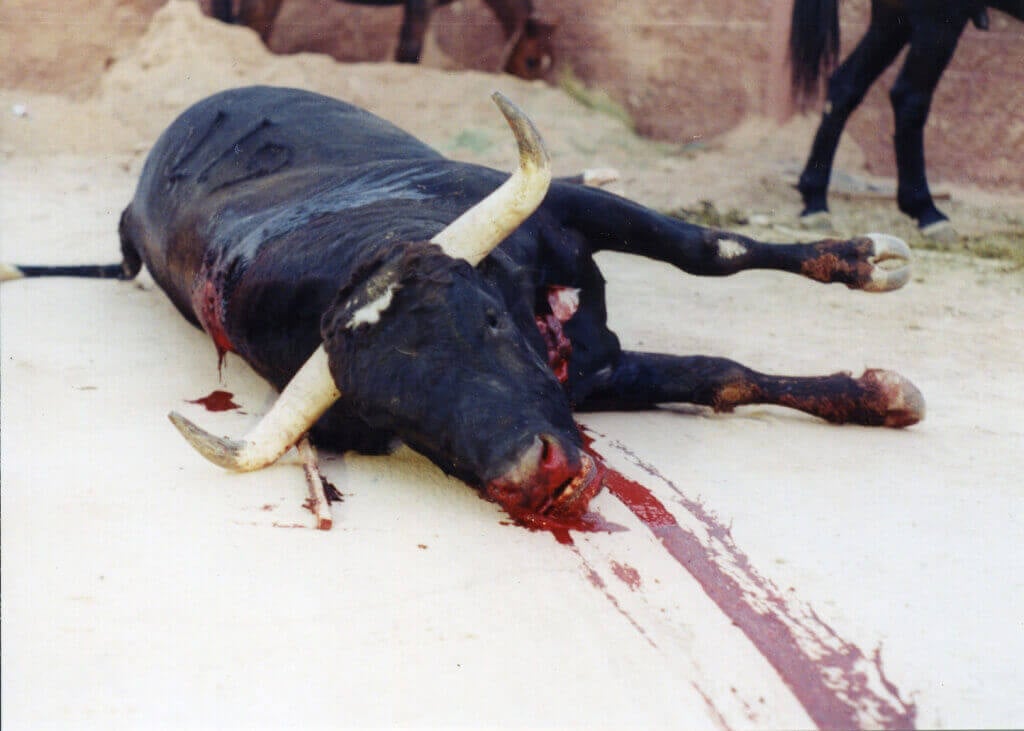
Bullfighting is a blood sport in which thousands of terrified and confused bulls are violently killed each year by armed cowards after they’ve been cruelly taunted, maimed, and mortally wounded.
It’s nothing more than a ritualized execution that involves repeatedly goading and stabbing a bull until he’s too weakened from blood loss to defend himself. A matador then plunges a sword into the animal’s heart or lungs. It can take many attempts to kill a bull this way, and if the matador fails to do so, a knife is used to sever the animal’s spinal cord, which may immobilize but not kill him. His ears or tail may even be cut off and kept as a trophy before he’s dragged out of the arena, sometimes while he’s still conscious and dying.
Tourists, a primary audience for bullfights, often flee in horror upon discovering how vile these events are, but by then, the damage has already been done—every ticket purchased keeps these sadistic spectacles alive. The good news is that opposition to bullfights is growing stronger by the day.
Rides on Horses, Donkeys, Camels, or Other Animals
Riding horses, donkeys, mules, camels, or any other animals is cruel. Animals used for rides are forced to bear the weight of humans and their luggage or to pull carriages. In Petra, Jordan, donkeys are compelled to scale and descend treacherous terrain and stairs. Handlers routinely whip and beat them, and if they resist or falter, the beatings often intensify. In Egypt, horses are forced to give carriage rides, and camels are used for rides and photo ops at top historical sites, such as the pyramids of Giza and Saqqara’s ancient burial site. These animals are frequently beaten and often forced to work in the heat without water and rest until their bodies give out.
Some travel destinations attempt to deceive and placate tourists by falsely claiming to have high standards of animal welfare. You can avoid putting money into the pockets of animal abusers by steering clear of these rides.
Horse-Drawn Carriage Rides
Horses suffer when they’re forced to pull loads full of passengers on the hard pavement of busy streets. An in-depth investigation by PETA India and the CAPE Foundation found that horses used to haul carriages in the tourist hubs of Kolkata, India, are commonly whipped and beaten while struggling to pull heavy carts all day in high temperatures and other weather extremes.
Even when these horses are exhausted, lame, injured, wounded, emaciated, or sick, they’re forced to work, stand in their own waste, and inhale exhaust fumes from the vehicles around them. They’re denied adequate food and water, contributing to physical exhaustion and other serious health problems.
It’s speciesist to exploit horses, including for tourist rides—so please never support these businesses.
Sampling of Civet Coffee and Other ‘Local Delicacies’
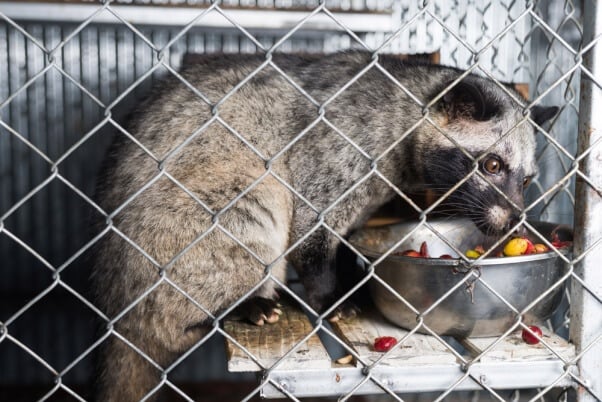
Kopi luwak is made from the beans of coffee berries that have been eaten and pooped out by Asian palm civets. To make this coffee, civet cats are typically snatched from their homes in the forest and imprisoned in tiny, barren cages. They’re used as processing machines and deprived of freedom, exercise, adequate space, and a natural variety of foods.
The kopi luwak industry is fueled by tourist attractions that offer samplings of the coffee and by exportation—it wouldn’t exist without naive consumers.
Tourists in search of “exotic” cuisine harm other animals, too. The snake-farming village of Lệ Mật, Vietnam, for example, offers tourist attractions that torment and kill snakes. Grim rituals, such as eating a snake’s still-beating heart and drinking their blood, have been called cruel by local residents and are sought mostly by Western tourists. And in France, most residents disapprove of the force-feeding of ducks and geese to produce foie gras.
The only compassionate meal is a vegan one. Check out these tips for eating vegan while on vacation.
Swimming With Dolphins and Manatees
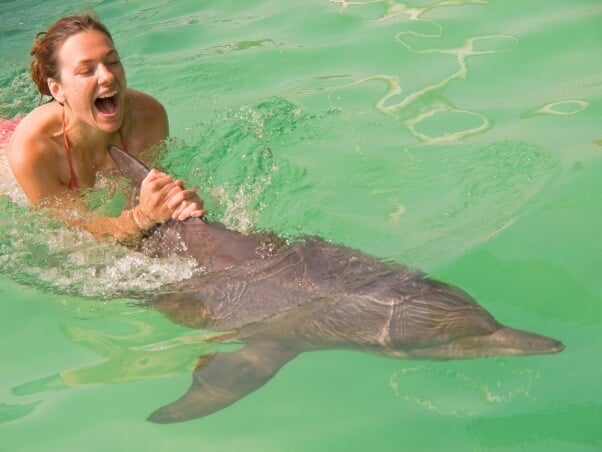
Seedy tourist attractions confine dolphins to tiny tanks or pools away from their ocean homes and force them to swim and interact with humans. Being imprisoned in cramped tanks and harassed all day long can be extremely traumatic for dolphins, social and intelligent individuals who, in nature, swim up to 60 miles a day with their families. Due to the stressful conditions of captivity, many dolphins develop painful health problems, such as stomach ulcers, and some die prematurely.
Manatees are a threatened species protected by state and federal laws. Nevertheless, some tour companies in Crystal River, Florida, have built businesses around harassing them and profit by disrupting their natural migration. These companies promote themselves by lying to tourists, claiming that swimming with manatees is a peaceful form of ecotourism when it’s anything but peaceful for the manatees.
If you want to see manatees in Crystal River, watch them from the boardwalks. No matter where you are, never support companies that disrupt the lives of manatees or any other animals.
Fish Pedicures
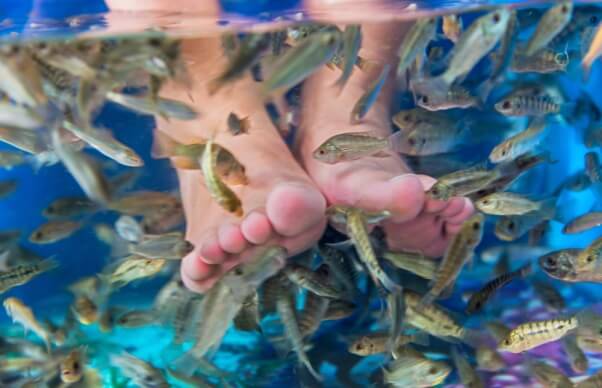
Although fish have voluntary symbiotic relationships with other sentient beings, they don’t want to eat human flesh. Cruel businesses that offer “fish pedicures” starve captive fish until they’re hungry enough to eat the skin on humans’ feet, eventually throwing them away when they are deemed to be no longer useful as if they were dull emery boards rather than living, feeling individuals. Some U.S. states have already banned fish pedicures, and others have similar legislation pending.
Visiting Shady Aquariums and Zoos
No roadside attraction can even begin to replicate animals’ natural homes. All these seedy operations do is teach people that it’s acceptable to imprison animals in unnatural and unhealthy situations, condemn them to extreme loneliness and frustration, and deny them all control over their own lives—which causes many to suffer from debilitating psychological distress.
Tiny tanks and barren cages are no place for animals who swim or roam hundreds of miles a day in nature. Oversight at these operations is often so bad that animals there die from preventable causes, and many have injured visitors. Animal attractions can’t keep exploiting animals unless people keep buying tickets, always so skip them.

Other Animals Don’t Want to be Exploited in Tourist Attractions—Travel With Compassion!
Remember, there are countless vegan travel activities that don’t involve exploiting animals. When you travel, you can attend animal-free circuses, drink local vegan wine, go dancing, visit museums, and much more. Check out PETA’s page on Tripadvisor for additional animal-friendly travel tips.
Also check out VegTravelBuddies, a website that will help you connect with other vegan travelers and like-minded folks. Other great vegan-friendly travel sites include Veg Jaunts and Journeys, Dive The World, and Laguna Lodge.
And if you’re traveling to the greater Manila area in the Philippines, you’ll have the opportunity to help animals by volunteering with PETA’s Kapon/Ligation Immediately, Please (KLIP) program:
The possibilities for a compassionate vacation are unlimited, so it’s easy to keep the exploitation of animals off your travel itinerary!

